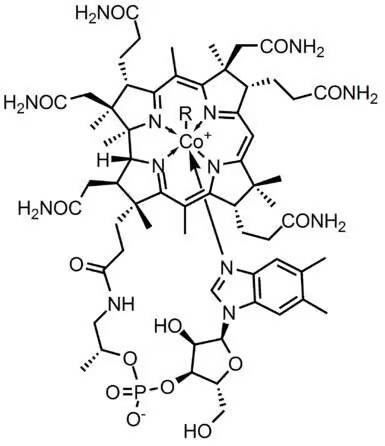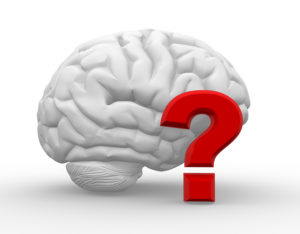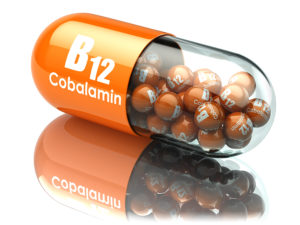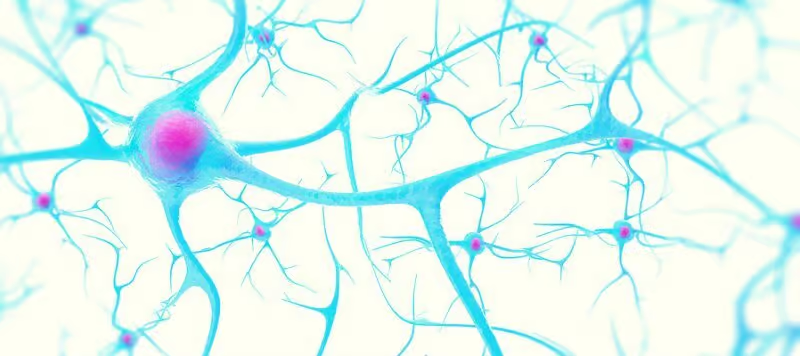Table of Contents
Vitamin B12 (Cobalamin) is one of 8 B-vitamins. B12 is water-soluble and found in every single cell in your body.
Vitamin B12 is essential for the synthesis of DNA, RNA and neurotransmitters, the maintenance of myelin sheaths protecting neurons, and red blood cell formation.
Deficiency in B12 results in myelopathy (spinal cord disease), neuropathy (nerve disease), sensory disturbances, imbalance when walking, weakness, and psychiatric problems ranging from cognitive and behavioral problems to dementia.
Maintain your optimal Vitamin B12 levels with the Performance Lab NutriGenesis® Multi for men and women.
Vitamin B12 (Cobalamin) helps:
- Cerebral Circulation: Vitamin B12 is needed to regulate homocysteine. High homocysteine levels are linked to inflammation that can lead to blood vessel damage. And possible plaque buildup leading to heart attack or stroke.
- Neurotransmitters: Vitamin B12 is a cofactor in the synthesis of neurotransmitters dopamine, GABA, norepinephrine, and serotonin. Affecting alertness, cognition, memory and mood.
- Mood: Vitamin B12 helps increase brain serotonin and dopamine levels. Decreasing anxiety, depression, fatigue and pain.
Overview
Vitamin B12 (Cobalamin) is one of 8 water-soluble B-vitamins that are absolutely vital to the highly optimized brain. And is essential to every cell in your body including your brain.
Vitamin B12 as a nootropic can improve alertness, energy levels, boost attention span, concentration, intelligence and memory. B12 supplementation can help relieve stress, depression, insomnia and help balance your mood.

Vitamin B12 has the coolest and most complex chemical structure of any nootropic we explore here on Nootropics Expert. Vitamin B12 is called “Cobalamin” because it contains the rare earth element cobalt.[i]
Vitamin B12 is absorbed in your intestines from food or a supplement using a process called intrinsic factor. The vitamin is then transferred to transcobalamin II (TC-II/B12) which acts as a transporter.
Through a very complex process which I’m not going to try to explain here, B12 is converted into the active forms coenzyme 5′-deoxyadenosyl and methylcobalamin (MeB12).[ii]
Foods rich in Vitamin B12 include fish, shellfish, meat (especially liver), poultry, eggs, milk and milk products.[iii] The two best sources by far of B12 are clams and liver.
You cannot get adequate amounts of Vitamin B12 from plants. Vegetarians and vegans are especially in danger of B12 deficiency. Regardless of what food and supplement manufacturers say.
Plant foods contain analogs of B12 which are similar to, but not the same as, Vitamin B12. They bind to B12 receptors and block your intake of true B12.
Trying to get your Vitamin B12 from yeast products like Red Star Nutritional Yeast or Marmite is also problematic. These products do not naturally contain B12 but are fortified with it.
And Vitamin B12 is light sensitive. If stored in open bins or clear plastic bags or jars, B12 vaporizes and disappears.
Meat and animal products are your best source of natural Vitamin B12. But once again, relying solely on food for adequate B12 is difficult because it is destroyed during cooking.[iv]
You are much safer using a good Vitamin B12 supplement for your nootropic stack. See “Available Forms” for more.
How does Vitamin B12 (Cobalamin) work in the Brain?
Vitamin B12 (Cobalamin) boosts brain health and function in several ways. But two in particular stand out.
- Vitamin B12 increases cognition. Vitamin B12 is a precursor in the biosynthesis of all major neurotransmitters in your brain including acetylcholine, dopamine, GABA, norepinephrine and serotonin.
Vitamin B12 is an integral part of the one-carbon cycle involved in the synthesis of methionine. This amino acid, methionine donates the methyl group required for methylation to occur.
This biochemical process helps synthesize neurotransmitters, myelin (the sheath that protects neurons), and keeps homocysteine levels in check. Elevated levels of homocysteine have been associated with several neurodegenerative diseases including Alzheimer’s and Parkinson’s Disease.
Even mild Vitamin B12 deficiency has been associated with accelerated cognitive decline. Researchers at Tufts University examined data from 549 men and women enrolled in the Framingham Heart Study.
They focused on scores on the Mini-Mental State Examination (MMSE), which is a short list of questions and tasks used to screen for dementia. The subjects were divided into 5 groups, based on their vitamin B12 blood levels.
MMSE scores declined by 0.24 points per year over the 8-year follow-up period. Cognitive decline was faster in the bottom 2 groups that had the lowest levels of Vitamin B12.
The researchers concluded that “having plasma (blood) Vitamin B12 levels from 187 to 256.8 pmol/L… predicts especially rapid cognitive decline”.[v]
- Vitamin B12 helps reduce depression. Vitamin B12 is a precursor in the biosynthesis of GABA and serotonin. GABA is an amino acid and neurotransmitter produced by glutamate in your brain. This inhibitory neurotransmitter prevents other ‘excitatory’ neurotransmitters from being released. Resulting in an anti-anxiety and calming effect.
Serotonin is a neurotransmitter made from the amino acid tryptophan. This inhibitory neurotransmitter governs the stimulatory neurotransmitter dopamine from overwhelming your brain. Adequate serotonin levels make you feel confident, easy-going, flexible, happy and positive.
One case study out of India reviewed the case of a 57-year-old woman who was given months of anti-psychotic and antidepressant medications. Including 2 rounds of electro-shock therapy before anyone thought to check her Vitamin B12 levels.
This woman’s symptoms included anxiety, constipation, movement abnormalities, perceptual disturbances (hearing her name called), lethargy, tearfulness and finally catatonia. She remained depressed, suicidal and lethargic despite her treatment.
Within 2 months of identifying her Vitamin B12 deficiency and subsequent treatment, this woman reverted to her baseline 14 years before. And remained stable with no additional treatment.[vi]
How things go bad
Vitamin B12 deficiency usually causes neurological and psychiatric issues in adults aged 40 – 90. B12 deficiency rarely affects younger people. But can be a problem if the mother is deficient during pregnancy.
A B12 deficiency can manifest as disease of the spinal cord (myelopathy), disease of the nerves (neuropathy), sensory disturbances, gait abnormalities, weakness, cognitive and behavioral disturbances and dementia.
↓ Neuron myelin sheath is damaged
↓ Neurons degenerate
↓ Weakness, vision problems, cognition issues, abnormal reflexes
↓ Bladder and erectile dysfunction
↓ Tingling sensation, pain and numbness
↓ Delusions, hallucinations, memory decline, depression and dementia
↓ Brain shrinkage
↓ Impaired DNA synthesis and replication
Vitamin B12 deficiency can often be caused by Pernicious anemia which is an autoimmune disease that affects the mucous membrane layer of the stomach. This can be a result of destruction of parietal cells, lack of hydrochloric acid, or a failure to produce intrinsic factor.
Parietal cells are required to create intrinsic factor to supply your body with adequate Vitamin B12. When these cells are damaged, intrinsic factor is not produced. And B12 cannot be absorbed for use by your body and brain.
Parietal cell death can be caused by excess alcohol consumption, ulcerative gastritis, H. pylori infection, gastric bypass surgery and even age.
Intrinsic factor is required for Vitamin B12 absorption from food or supplements. If left untreated you experience B12 deficiency even if you’re getting B12 from food or supplements.
If you or your doctor suspect Vitamin B12 deficiency and does a blood test, the labs may show B12 levels within the bell curve. But it doesn’t reflect how much B12 is actually in your cells.
Pernicious anemia is sometimes passed down through families. This is most common in those of Scandinavian or northern European descent. Grave’s Disease, and Addison’s Disease. Type-1 diabetes can also cause pernicious anemia.
Review the symptoms of deficiency listed here. Do your research. And if you suspect you may be deficient in Vitamin B12, tell your doctor and take action now. If your doctor tells you it’s not a problem, please find another doctor!
Vitamin B12 (Cobalamin) benefits
When you take Vitamin B12 (Cobalamin) as a nootropic supplement, it is transported across your intestinal wall by the carrier protein intrinsic factor. It is then degraded, freeing cobalamin to be attached to transcobalamin II for transport to cells in your body.[vii]
Vitamin B12 is a co-factor in the one-carbon cycle that is required for the synthesis of DNA, RNA, neurotransmitters (acetylcholine, dopamine, GABA, norepinephrine and serotonin), and the myelin sheath that protects each of the neurons in your brain.
This one-carbon pathway is involved in the synthesis of the amino acid methionine. This amino acid donates methyl groups for the methylation of DNA, RNA, neurotransmitters and myelin.
Methionine is synthesized from the amino acid homocysteine. Preventing high levels of this amino acid to accumulate will prevent problems throughout your body including neurodegenerative disease.
Cobalamin is also required for the conversion of methylmelonyl CoA into succinyl Coenzyme-A for the myelin sheath that protects your neurons. Problems with this conversion degrades myelin. Causing problems with your central nervous system and damaging axons on the neurons in your brain.
Vitamin B12 can:
- Reduce the severity and frequency of asthma attacks and allergies
- Reverse early signs of Alzheimer’s Disease if caught in time
- Lift your mood by boosting the “happy molecule” serotonin in your brain
- Reduce the side effects of Metformin in diabetes patients
- Provide optimal concentration, focus and memory
- Reduce the risk of macular degeneration and prevent blindness
- Maintain healthy hair, skin and nails
- Remove homocysteine and protect your heart
- Raise sperm counts and improve sperm mobility in men
- Prevent neuron damage if you lack intrinsic factor
- Reduce some of the symptoms of schizophrenia
- Help prevent osteoporosis and build strong bones
The key message here is to maintain optimal Vitamin B12 levels in your body and brain. Don’t be duped by marketers selling Vitamin B12 energy drinks boasting more energy. Or a magic pill to boost memory, or aid in weight loss.
If you have a specific health problem like pernicious anemia or are deficient in this vitamin, then B12 can help. If you maintain optimal levels of Vitamin B12 in your system, supplementing will not increase your energy levels.
Vitamin B12 is a key brain vitamin that plays an important role in a healthy nervous system and optimally functioning brain. Low levels of B12 can definitely lead to poor memory and cognition.
How does Vitamin B12 (Cobalamin) feel?
Neurohackers who supplement with Vitamin B12 report a reduction in brain fog and better sleep.
People on statins for cholesterol and metformin for diabetes report a dramatic decrease in pain.
Neurohackers report better focus and mood, colors seem brighter and more intense, energy levels improve, and an overall improved sense of well-being.
If you are Vitamin B12 deficient you may feel a big boost in energy. And feelings of deep exhaustion can disappear within a few days.
Vitamin B12 Clinical Research
Much of the research in Vitamin B12 and B12 deficiency are presented as individual ‘case reports’ on one person.
One report in French was about a woman with no history of psychiatric problems. But upon admission she was uncooperative, disoriented, had memory and attention problems, a sleep disorder and she looked older than her real age.
This woman was depressed, had a guilt complex, devalued herself, and her movements and speech were very slow. A lab test revealed she had a problem with intrinsic factor.
Her therapy was Vitamin B12 replacement using hydroxycobalamin 1,000 mg per day for 10 days. Her mental state improved dramatically within a few days.[viii]
Another case report was of a middle-aged man with Obsessive-Compulsive Disorder (OCD). He was given methylcobalamin therapy and symptoms of OCD dramatically improved.[ix]
Vitamin B12 and Folate Prevent Alzheimer’s
A study in Stockholm explored the association of low Vitamin B12 and folate levels with the occurrence of Alzheimer’s Disease. A population based study sampled 370 non-demented people aged 75 years or older and who had not been treated with B12 and folate.
This group was followed for 3 years to detect the incidence of Alzheimer’s. The researchers compared low levels of B12 and folate with people who had normal levels of the two vitamins.
Subjects who had low levels of Vitamin B12 or folate had twice the risk of developing Alzheimer’s. And this association was even stronger in subjects with good baseline cognition.
The study concluded that Vitamin B12 and folate may be involved in the development of Alzheimer’s Disease. And that monitoring blood B12 and folate concentration in the elderly may be relevant for the prevention of Alzheimer’s Disease.[x]
Vitamin B12 (Cobalamin) to Treat Depression
Research shows that people with major depression often have low blood levels of folate and Vitamin B12. Low folate levels are also linked to poor response to antidepressants. And treatment with folic acid and/or Vitamin B12 has been shown to improve response to antidepressants.
Folate and Vitamin B12 are involved in one-carbon metabolism in which SAM-e is formed. SAM-e donates methyl groups that are crucial for neurological function.
Increased homocysteine is a functional marker of both folate and Vitamin B12 deficiency. Increased homocysteine levels are found in depressed patients. One study out of Norway showed increased blood levels of homocysteine were associated with increased risk of depression (but not anxiety).
The researchers concluded that doses of both folic acid (800 mcg daily) and Vitamin B12 (1 mg daily) should be tried to improve treatment outcomes for depression.[xi]
Vitamin B12 recommended dosage
Vitamin B12 is water-soluble, and considered non-toxic in recommended doses.
A varied diet including meat, seafood and milk products should provide enough Vitamin B12 to prevent deficiency. But vegetarians and vegans cannot get enough B12 from food and should supplement.
Typical recommended dosage for nootropic benefit and optimal brain health is 100 mcg or 0.1 mg of Vitamin B12 per day.
Neurohackers older than 40 and those who have a problem with Vitamin B12 absorption should use 100 – 400 mcg or 0.1-0.4 mg of B12 per day.
If you test Vitamin B12 deficient, recommended dosage is 2,000 mcg daily for a week, then 1,000 mcg doses of B12 once per week for a month. Thereafter, your maintenance dose is 1,000 mcg monthly.[xii]
Vitamin B12 Side Effects
Vitamin B12 (Cobalamin) is non-toxic. So is considered well-tolerated and safe.
Doses as high as 2 mg of Vitamin B12 daily by mouth or 1 mg monthly by injection have been shown to produce no significant side effects.
When high doses of Vitamin B12 are given orally, only a small percentage can be absorbed which likely explains the low toxicity levels.
Proton pump inhibitors and other drugs used to treat acid reflux is known to prevent absorption of Vitamin B12. So you may need to take B12 sublingually.
Antibiotics, drugs to treat gout and metformin to treat diabetes all decrease Vitamin B12 levels or B12 absorption. If you use any of these drugs you should have your levels checked and possibly supplement with Vitamin B12.
Nitrous oxide used as an anesthetic and recreational drug oxidizes and inactivates Vitamin B12. So you should likely get tested and possibly supplement with B12.
Type of Vitamin B12 to buy
Vitamin B12 is available as tablets, capsules, liquid drops, sublingual tablets, sprays and lozenges.
The sublingual tablets, sprays and lozenges are marketed as more absorbable or bioavailable. Some clinical studies do not support this claim but user experience shows otherwise.
Logic tells us that a lozenge or spray absorbed under your tongue gets into your bloodstream and across the blood-brain barrier more readily than something you swallow and need to digest.
Low quality Vitamin B12 supplements, and B12 found in multivitamins or B-Complex formulas, is usually cyanocobalamin. This form of B12 is not well absorbed, and produces a small amount of cyanide in your body (cyanocobalamin).
Higher quality Vitamin B12 comes as methylcobalamin or adenosylcobalamin which are the forms of B12 naturally occurring in your body.
Methylcobalamin is your better choice if you are deficient in B12, or have the MTHFR genetic defect which reduces your ability to methylate this vitamin.
One good option is using a multivitamin like the Performance Lab® NutriGenesis Multi which uses this nature-identical form of B12.
I prefer the Performance Lab® multi because it’s more potent, it’s biologically active and I’ve found to be a far more effective multi compared to every other multivitamin supplement I’ve ever used.
Performance Lab® uses their own priority NutriGenesis® vitamins and minerals which are grown on probiotic, plant and yeast cultures in a state-of-the-art lab.
Adenosylcobalamin works better for some who want to avoid the cyanide that comes in cyanocobalamin, and who can’t tolerate methylcobalamin.
Hydroxycobalamin is another high quality form of Vitamin B12 that converts to methylcobalamin in your body.
If you test Vitamin B12 deficient, your doctor may encourage you to get Vitamin B12 shots. Especially if you have pernicious anemia, nerve damage or chronic digestive problems like Crohn’s Disease or ulcerative colitis.
But research has found that taking oral B12 supplements is as effective as B12 shots.[xiii] And user reviews support this finding.
Note that Vitamin B12 needs to be balanced with Vitamin B6 and Folate (folic acid) for best results if using as a nootropic supplement.
Another good option is using a BioActive B-Complex like the Click for Performance Lab® B-Complex
which contains nature-identical forms of both Vitamin B12 and folate.
Nootropics Expert Recommendation
Vitamin B12 (Cobalamin) 100 – 400 mcg per day
 I recommend using Vitamin B12 as a nootropic supplement.
I recommend using Vitamin B12 as a nootropic supplement.
Your body does not make Vitamin B12 on its own. So to get its benefits you must get it from food, or take it as a supplement.
I recommend staying away from cheap cyanocobalamin B12 supplements. Go with Methylcobalamin, Adenosylcobalamin, or Hydroxycobalamin.
Vitamin B12 is especially helpful for those dealing with brain fog, fatigue, nerve pain, sleep and memory problems.
Vitamin B12 supplementation is critical for anyone over 40 years old because of absorption issues with B12 from food.
Vitamin B12 is also particularly helpful if you are using proton pump inhibitors for acid reflux, have Type-1 diabetes, or show positive for dementia or Alzheimer’s.
The recommended dosage for Vitamin B12 deficiency is 2,000 mcg daily for a week, then 1,000 mcg doses of B12 once per week for a month. Then your maintenance dose is 1,000 mcg monthly.
Remember that Vitamin B12 needs to be balanced with Vitamin B6 and Folate (folic acid) for best results if using as a nootropic supplement.
One excellent option for getting your daily dose of Vitamin B12 and folate is with BioActive B-Complex supplement – the Click for Performance Lab® B-Complex.









Join The Discussion - 88 comments
Domagoj
October 20, 2022
what are the “normal”/reference levels (pmol/L) of b12 in body? i found different values…
David Tomen
October 22, 2022
A normal vitamin B12 level is between 200 to 800 picograms per milliliter (pg/mL).
Marco
August 8, 2022
Hi David,
I don’t really understand the dosage recommendation on this one.
You are writing:
“Typical recommended dosage for nootropic benefit and optimal brain health is 100 mcg or 0.1 mg of Vitamin B12 per day.
Neurohackers older than 40 and those who have a problem with Vitamin B12 absorption should use 100 – 400 mcg or 0.1-0.4 mg of B12 per day.”
After that, in the Expert Recommendation, you recommend 1mg (1000 mcg) per day.
What would be the right dose for nootropic use, in combination with lets say NALT and/or ALCAR ?
Thanks in advance.
David Tomen
August 8, 2022
Marco, my mistake. It should read under “Nootropics Expert Recommendation” 100 – 400 mcg per day. The lower dose if you are not deficient. Higher dose if you are older and your body naturally has a hard time digesting and absorbing V12 into cells. Consistent daily use will allow your B12 levels to build up to healthy levels for use by anything you are doing.
marco
August 9, 2022
Thank you for clarifying!
amindQS
August 2, 2022
What are the best times to take B12?
David Tomen
August 2, 2022
The best time to take Vitamin B12 is every day. But you need to find the right dose for you. Because in excess it will cause problems.
It’s true that your body can produce B12 but it is manufactured in an area of your colon where it cannot be absorbed by a lot of people. And is why many are B12 deficient and not aware that they are.
amindQS
August 2, 2022
Good morning David, is it true that B12 is produced by gut bacteria and there is no need to take it as a supplement?
Cesar
May 28, 2022
Hello David, I would like to know your opinion please.
in 2019, a study was carried out where they found that the consumption of vitamin B12 is associated with all-cause mortality, regardless of traditional risk factors.
I wanted to know if, knowing this,
do you still think it is safe to supplement with a multivitamin that contains up to 300 mcg of Methylcobalamin?
This is the link of the study:
https://jamanetwork.com/journals/jamanetworkopen/fullarticle/2758742
David Tomen
May 30, 2022
Cesar, the problem is supplementing with individual B-Vitamins. They work in synergy. If you are going to supplement B12 get it from a high quality multivitamin or bioactive B-Complex.
Jon
March 28, 2022
I would add it’s not just folic, it is iron too. Taking a lot of b12 and a lot of folic will make you low in iron and iron as a supplement is often more unpleasant but still essential, (changes colour of your number 2s, dosing requires a bit more patience, don’t just go for max and vit c helps with absorption, and the body has quite a large range of iron acceptability due to iron stores). Also copper can also be eventually involved in this triangle of doom if you find yourself chasing one then the other … Not trying to put anyone off, but just be careful if you are taking a lot of B12 regularly, it is quite easy vitamin to overdose on without realising until you start to get tired. More so for those who have coeliac as iron also struggles to absorb, so your starting conditions might be lower. Of course! Some people have the opposite issue – stomach struggles to absorb B12 and these guys often need injections instead. A very good set of supplements if you get a nasty infection like glandular fever and (temporary) enlarged spleen from said infection – prick you finger and you’ll see your blood is redder than normal due to the blood formation benefits these supplements bring. Anywho, thought i’d share my experience.
David Tomen
March 28, 2022
All good advice Jon. Iron is often overlooked because no one talks about it.
I don’t think it’s a good idea to use individual B-Vitamins because you end up throwing everything out of balance. Dosing individually takes a lot of skill, patience, and knowledge. As you pointed out.
Jeremy
March 26, 2022
Hello David
If I eat a good diet how often should I take this? I often have low B12 used to just take B12 but read you need all B vitamins to work well
Country Life Coenzyme B Complex
I’ve been taking one once a fortnight
David Tomen
March 27, 2022
Jeremy, there is no way to tell how much of each B-Vitamin you are getting from your daily diet. I suggest using this supplement daily because they are water soluble and your body will expel what it does not need. Long-term use should get your B12 levels back into range.
Alberto Lopez
February 13, 2022
Hello David,
I have been having trouble falling asleep for some time now, which I attribute to anxiety and stress, and trying different natural solutions. I usually try combinations of magnesium, tart cherry, melatonin and tryptophan, in some cases I see that they help, but I always find side effects the next day, to a greater or lesser extent.
Additionally, I have recently started to introduce vitamin B12 with the idea of having more energy during the day, and better cope with the stress of work. I started using a 1000 mcg sublingual supplement, cyanocobalamin. It worked well for the goal of more energy during the day, but was disastrous for my sleep problems, as it worsened them due to overstimulation. I assumed it was due to the high dosage, so I recently tried another supplement that provided the minimum recommended dosage, 2.4 mcg, cyanocobalamin. The effect during the day was more subtle, but it still had a negative impact on falling asleep again! 🙁
My question is this: am I too sensitive to the effect of B12, and should I not use supplements, considering my difficulty in falling asleep due to lack of relaxation? Would it be the same with any of the B12 formulations? I had the idea that somehow B12 might also help me with my sleeping problems, but it hasn’t. I’m not sure if I should be taking B12 supplements.
Thank you very much in advance for your comments.
Best regards
Alberto
David Tomen
February 14, 2022
Alberto, of all the B-Vitamins, you need to be careful with Vitamin B12 and not use it in excess. The other problem is using only one B-Vitamin because they work in synergy. For example, Vitamins B6, B9 and B12 must be in balance or you’ll end up with too much homocysteine which can eventually result in a heart attack. You need a bioactive B-Complex like this one if you are going to supplement: https://amzn.to/3syVpYY
For sleep, this stack will get you started: https://nootropicsexpert.com/best-sleep-supplements-to-buy/
If that does not work then I suggest scheduling a consultation with me: https://nootropicsexpert.com/personal-consultations/
Alberto Lopez
February 15, 2022
Many thanks for your comments, David, truly appreciated 🙂
Best regards,
Alberto